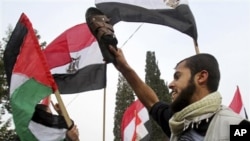The massive demonstrations and political upheaval in Egypt are being hailed as a new Arab awakening by Palestinians in East Jerusalem, the West Bank and Gaza Strip. Middle East analysts say the turmoil could empower a new and younger generation of Palestinian leaders seeking both personal dignity and a more democratic future.
As Arab music fills the air just after nightfall on East Jerusalem's bustling and colorful streets, the chief topics of conversation among Palestinians here are the astonishing developments in Egypt.
Close watch
The Egyptian revolt against President Hosni Mubarak's three decades in power and his decision not to seek re-election are both fascinating and stunning to many here in East Jerusalem.
"Palestinians are glued to the TV and following the news every minute," said Mahdi Abdul Hadi, chairman of the Palestinian Academic Society for the Study of International Affairs in East Jerusalem.
Hadi is considered a leading political analyst in the region. He says the uprising of young Arabs seeking a better life and more democratic future represents a generational change in the Middle East.
"This wave is there and nobody can have a blueprint where it will lead us," added Hadi. "Because it is not traditional. It is not classic. It is not any more the thinking of the elites and the business. These young people, they want their dignity. Maybe this is a new way of portraying democracy."
Mubarak
Many Palestinians consider President Mubarak an ally for his role in peace talks with Israel, and for seeking reconciliation among rival Palestinian factions in the West Bank and Gaza Strip.
Dimitri Diliani is a member of the Fatah Revolutionary Council in east Jerusalem. He says some Palestinians have mixed feelings about the uprising in Egypt.
"We respect the people's opinions and concerns and their needs, but at the same time we appreciate President Mubarak's position on the peace process, his support for the peace process for many years," said Diliani.
Better future
Mahmoud Muna, 28, is a Palestinian who works in his family's bookshop in East Jerusalem. He hopes the winds of change in the Arab world will lead to a better future for people across the region.
"I guess the word is cautiously positive, really, cautiously excited about what is happening," said Muna. "We are hoping that this will develop into a Middle East revamp. A Middle East reshaping of the Middle East to get proper democracy around the Middle East countries and Palestine included."
In the West Bank, Palestinian President Mahmoud Abbas has ordered his ministers and other government officials not to talk publicly about the situation in Egypt.
Anger toward Israel
Dimitri Diliani of the Fatah Revolutionary Council says Palestinians in the West Bank live better than many in poorer Arab countries and focus their anger more on the Israeli occupation than the Palestinian leadership.
"It is clear that the Palestinians in the West Bank, we do have a lower unemployment rate than other countries [and] better economic growth," added Diliani. "But at the same time, the obstacle to our development has been the occupation and the state of Israel, and towards that we do have almost daily uprisings and demonstrations."
Cause and effect
Diliani says some are concerned that if a transformation in the political leadership in Egypt comes too quickly, it could have a harmful impact on efforts to negotiate peace between Israel and the Palestinians.
"If change in Egypt took its time, that means the Egyptians can preserve the political discourse regarding the peace process, and therefore, maybe this would help with the peace process rather than affect it negatively," added Diliani. "So Egypt plays a huge role in the peace process and a huge role in influencing Arab countries. It is very important to be careful how to deal with Egypt."
Social networking
Back on the streets of East Jerusalem young people are using social networks to keep up with and discuss the rapidly changing events in Egypt. Mariam Ikermawi, 33, is a Palestinian activist who is director of the Jerusalem Center for Women.
"Oh my God, it is happening. Oh my God, Egypt has actually awakened," said Ikermawi. "And it has awakened like the youth has awakened… Using technology, using Facebook, using the Internet, using Twitter, this makes me very proud."
Analyst Mahdi Abdul Hadi says the uprising in Egypt is inspiring a growing confidence among young people to publicly express themselves after years of being too afraid to speak their minds.
"The positive thing is the awakening," said Hadi. "The positive thing is that people come to know the truth. The most important thing, the culture of fear is dead. Nobody is afraid of spelling [out] his opinion, his position, and his belief, and everybody is accepting to pay the price for that, especially the young generation."
Abdul Hadi says he believes the rebellion against autocratic rule will open a new chapter of Palestinian unity and help pave the way for a fresh generation of young Arab leaders.




